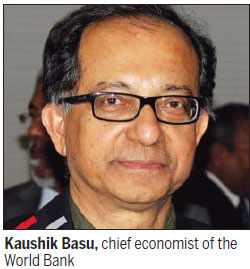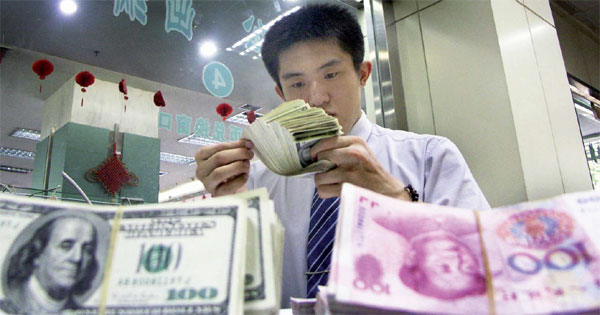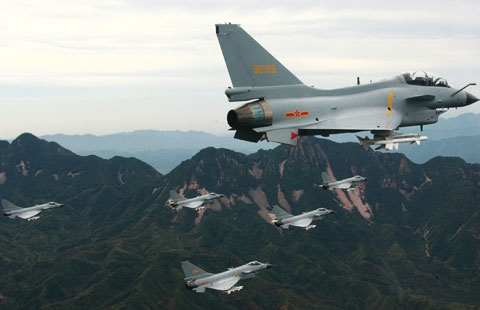Taking the reins in global finance
Updated: 2014-09-05 07:28
By Jennifer Lo(China Daily Europe)
|
|||||||||||
World bank chief economist notes Renminbi's rise is being matched by more Chinese in senior roles
The Chinese renminbi could become an international currency in five years, according to Kaushik Basu, chief economist of the World Bank.
"Ten years is certainly feasible, but I am saying it is possible to drive this within five years," Basu told China Daily in an exclusive interview after giving a lecture at the business and economics faculty at the University of Hong Kong recently.
|
China is promoting the wider use of yuan around the world to further internationalize its currency. Provided to China Daily |
The issue is a familiar one for Basu, who has held professorships at esteemed educational establishments on three continents as well as being a former chief economic adviser to the Indian Ministry of Finance.
"If I were the chief economist of the Chinese government, I would recommend very strongly that you try to internationalize the renminbi," he says.
A necessary condition for the internationalization of the renminbi, or the yuan, is that it must go hand-in-hand with the opening of the capital account and a very stable monetary policy, Basu says.
"The central bank of China has to give confidence to the world that it is going to function similarly to the (US) Fed, Bank of England and Bank of Japan, and that the Renminbi is as dependable as the euro, dollar, yen and the British pound, which are international currencies."
"It's the confidence part which takes longer than other things. China can set itself a five-year deadline and drive for that," he adds. "It's not easy, but it's the correct direction."
Echoing Basu is global bank HSBC, which predicts the yuan will become one of the top three globally-traded currencies by the end of 2015. Last year, yuan transactions rose to $120 billion (91.4 billion euros) in April, making it the ninth most traded currency, up from 29th in 2004, according to the Bank for International Settlements in Basel, Switzerland.
Basu suggests that the renminbi does not need to be fully internationalized in one go. Instead, it can first become a currency that is widely used in some regions. "You start in small steps, then float it," he says.
Turning to the outlook for China, Basu is cautiously optimistic. Gone are the days when economic development in China was fueled by nearly double-digit growth for three decades.

"Ten percent per annum was a magical growth rate for a big country (like China). There is no other comparable example in the globalized history," Basu says.
The World Bank's forecast is that China will grow at a steady rate of 7.6 percent over the next three years. "Ultimately the growth will come down, but for China some more years of 7 to 8 percent growth is possible," he says.
Basu also warns of a small risk factor, which has to do with China's financial sector and overall credit situation.
In response to earlier media reports that China might face a US-style debt crisis, he says: "It does not mean that China will (necessarily) have a crisis like that, but 2008 is important as a reminder that the financial market is difficult to manage once the debt is large. It can overshoot or undershoot."
Few are likely to forget that when the People's Bank of China tried to tighten credit to rein in the shadow banking sector in June last year, the overnight Shibor, or Shanghai Interbank Offered Rate, jumped to a record high of 30 percent. The 7-day Shibor rose to 13 percent.
"(Part of it is) because there is no hard science of controlling debt: it's part science, part statistics, and part judgment," he says. "What I mean is, there is no textbook rule of doing it."
Currently, China's aggregate credit-to-GDP ratio is 200 percent, an unprecedented level for any developing country. This can be compared to the high debt levels of eurozone crisis countries, such as 267 percent in Greece and 363 percent in Spain in 2011, according to McKinsey Global Institute.
A dilemma is that when China's economy begins to slow down, the government could be tempted to ease liquidity to stimulate growth, Basu theorizes. This was illustrated by a distinct increase in liquidity in May when China's public finance expenditure surged 13 percent year-on-year to 5.26 trillion yuan in the first five months of 2014, according to official data.
"This is of course good for growth but it creates a bit of a long-run risk that credit is building up, liquidity is building up," he says.
Nevertheless, Basu believes the Chinese government is on the right track to resolve the looming crisis, although short-term turbulence is unavoidable during the period of correction to curb shadow banking and excess liquidity. The silver lining, he says, lies in China's deep strengths $4 trillion of foreign reserves, robust investments and high levels of savings.
China's economic success in recent decades has also translated into a more important role in global financial management for the world's second-largest economy. One observation is the surge of Chinese people joining senior ranks in international organizations after the global financial crisis.
"In fairness, that should happen," he says. "China is now a global player. The world has to make way for a global player to be part of the global discussion and decision-making."
For instance, Basu's predecessor as chief economist at the World Bank is Justin Yifu Lin, while Shengman Zhang is a former managing director of the World Bank. Another Chinese to assume a senior position at an international financial institution is Zhu Min, currently deputy managing director of the International Monetary Fund.
Even seeing a World Bank president from China is not entirely impossible although it might take some years to realize, Basu predicts. The post, which has been filled predominantly by US politicians and bankers, has been filled by South Korean-born physician Jim Yong Kim since 2012.
"A Chinese president is not an offer that will come up on a tray and be given to China," he says. "But with a little bit of campaigning, I think it will open up ultimately to the world and there will be a global search of talent for somebody from Asia and Africa."
As for now, the World Bank's main journal, World Bank Economic Review, will soon launch its first Chinese edition. "That's my initiative," Basu says. "It will be the world's first economic journal in English and Chinese."
jennifer@chinadailyhk.com
(China Daily European Weekly 09/05/2014 page23)
Today's Top News
NATO to offer tailored support to Ukraine
Babies bob about in water at US's first baby spa
News website staff face extortion probe
China's meeting on 13th five-yr plan
Number of visitors to China drops
Export of mooncakes on the rise
Putin outlines ceasefire plan for Ukraine crisis
China paves way for sports investors
Hot Topics
Lunar probe , China growth forecasts, Emission rules get tougher, China seen through 'colored lens', International board,
Editor's Picks

|

|

|

|

|

|






